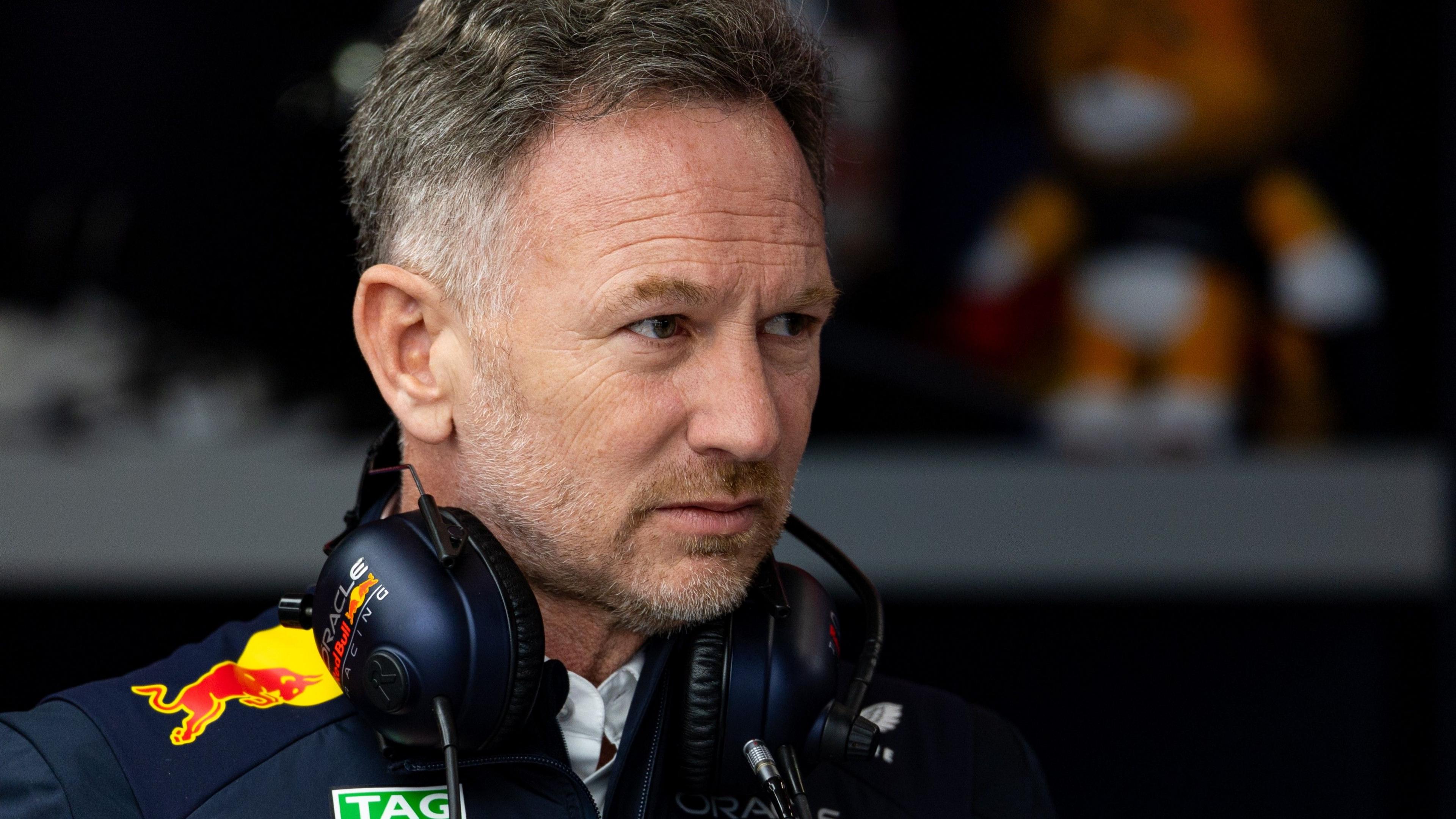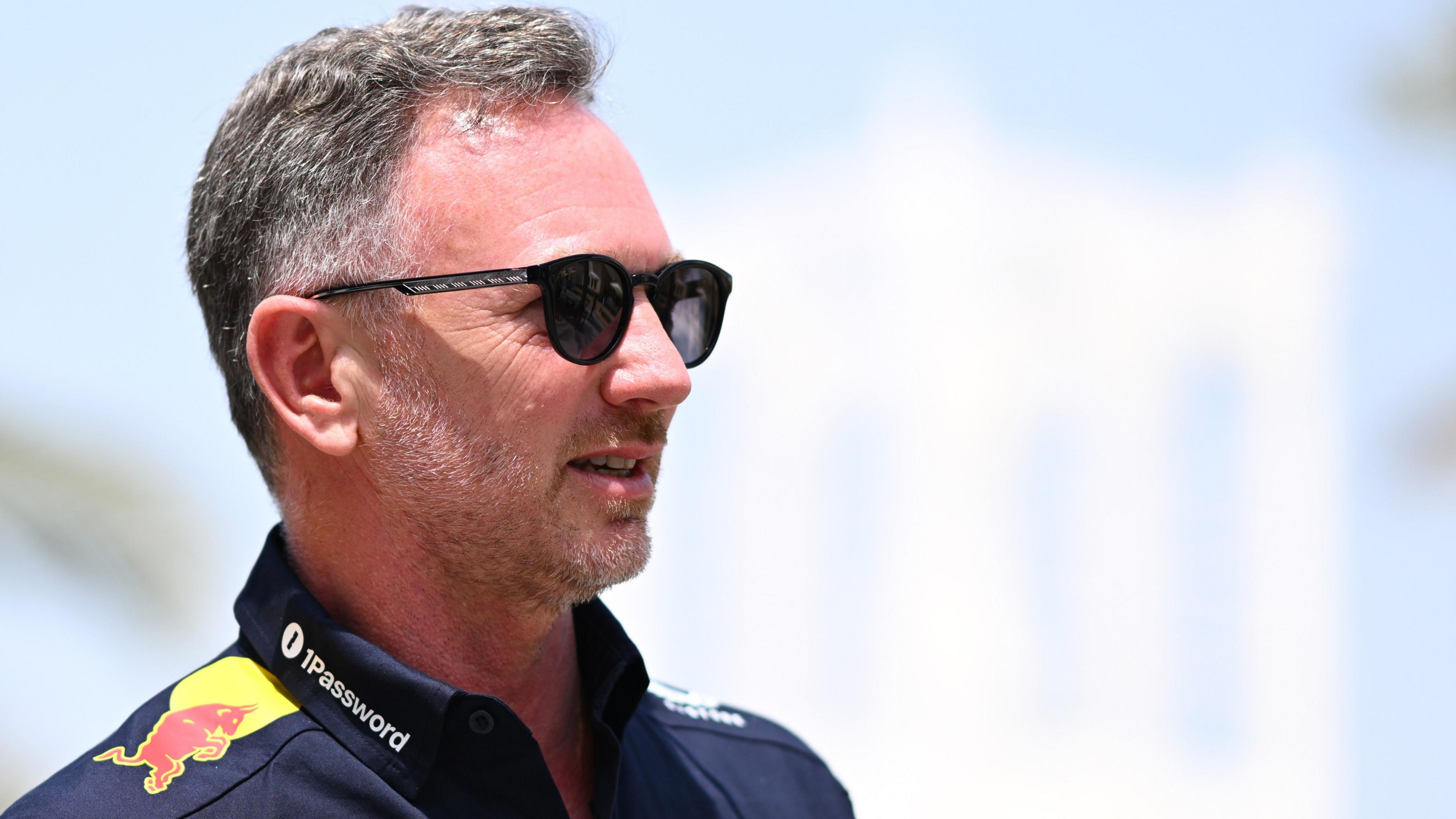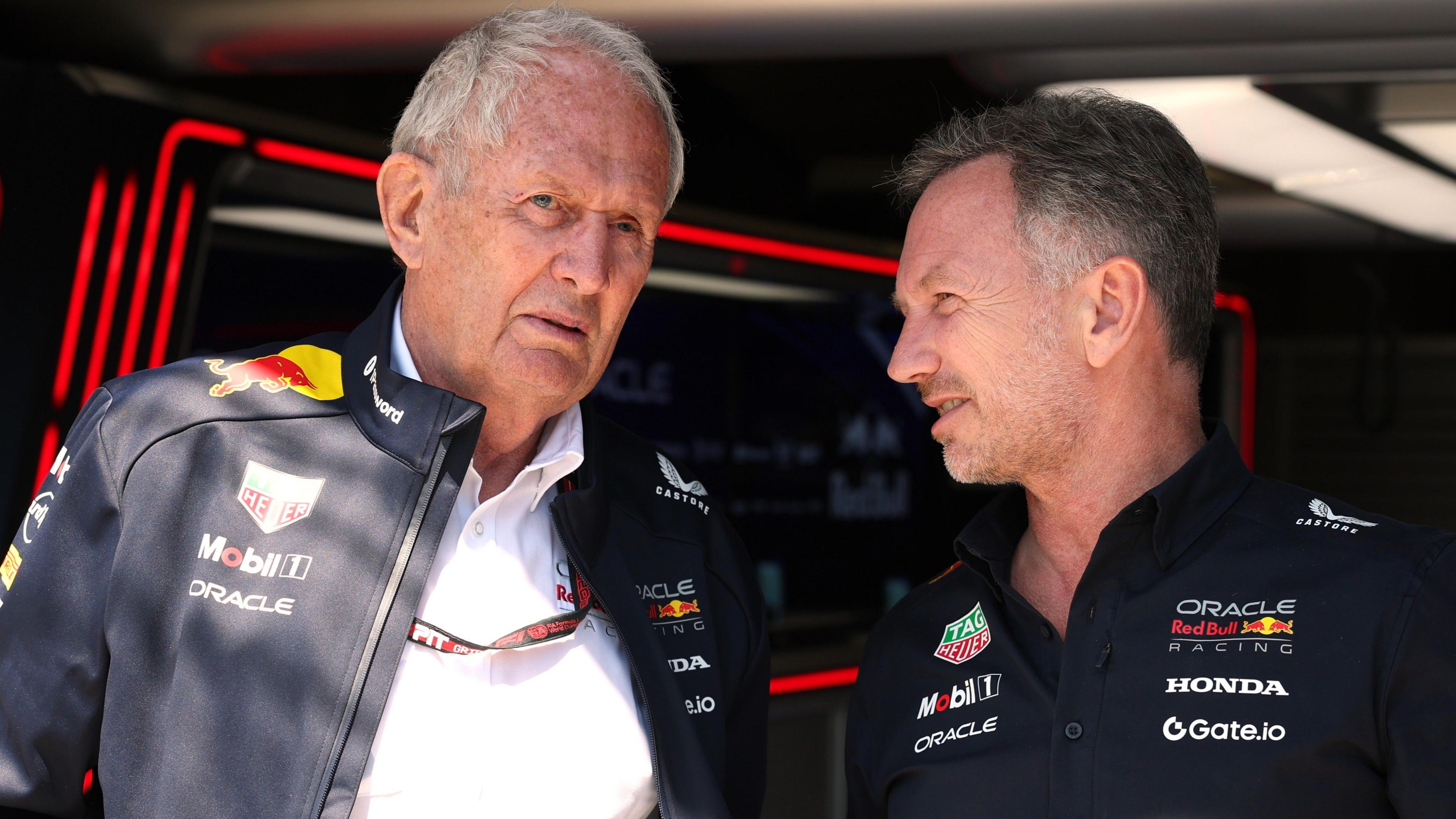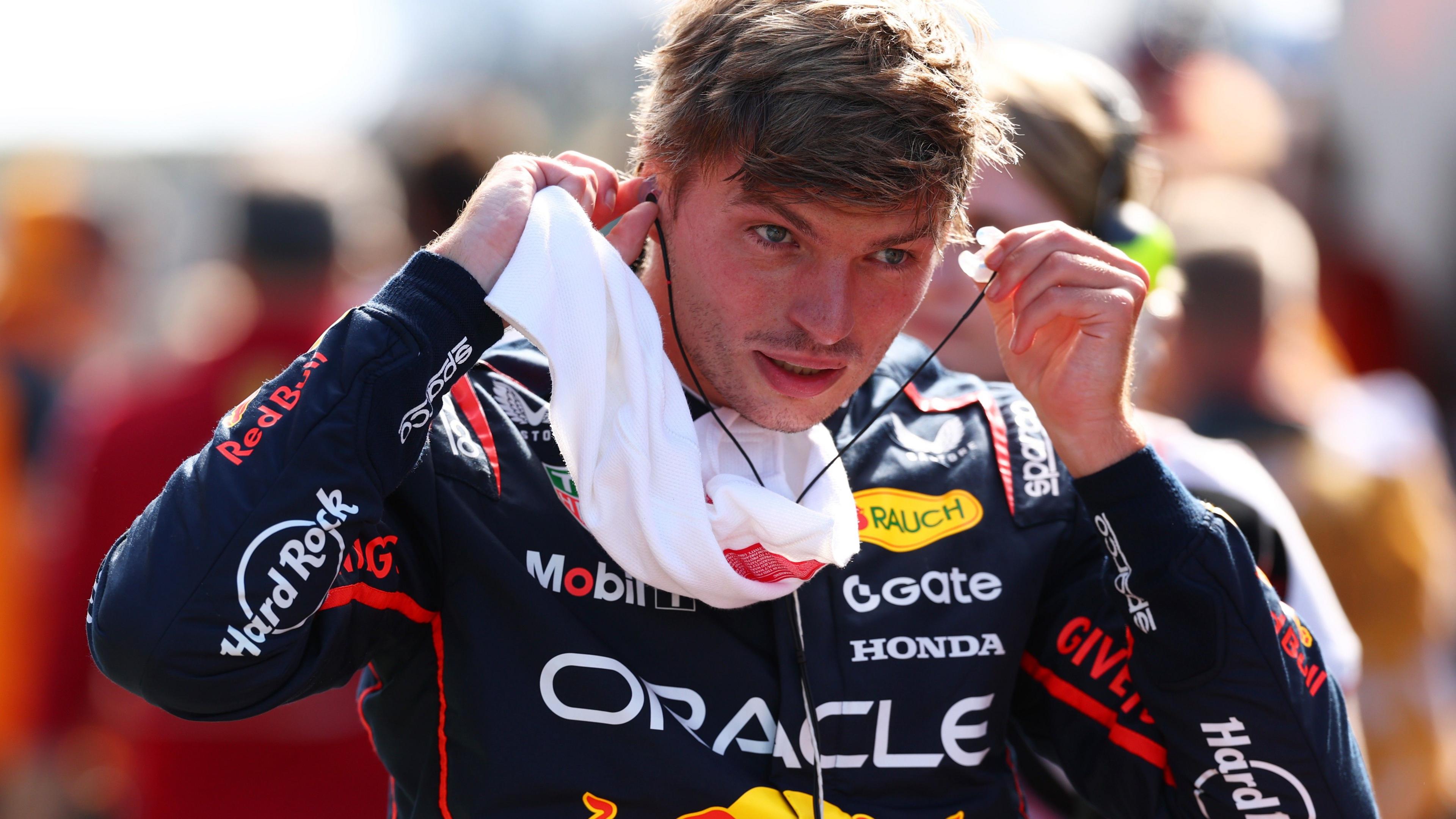Horner, the £52m pay-off, and what next for ex-Red Bull boss?

Christian Horner secured a pay-off from Red Bull worth 60m euros (£52m)
- Published
Christian Horner formally leaves Red Bull a very rich man with unsated ambitions in Formula 1.
The severance of the 51-year-old's links with the team he made one of the most successful in the sport was confirmed on Monday.
Red Bull gave no details about the settlement terms, but BBC Sport has been told by a source close to the team that Horner secured a pay-off worth 60m euros (£52m).
The move frees Horner up to return to F1 in the future - if he can find a project that is willing to take him on board.
But what are the chances of that, why has he been paid off in such a way, and how will this reflect on Horner and Red Bull?
Horner formally leaves Red Bull with £52m pay-off
- Published22 September
Verstappen wins in Baku after Piastri crashes out
- Published21 September
Why such a big settlement?

Horner was contracted to the end of 2030 with Red Bull
Different figures have been published for Horner's settlement.
BBC Sport is confident in the source behind the figure of 60m euros. Others have reported it as more - the Daily Mail says 92m euros (£80m), while motorsport website The Race has said $100m (£74m).
Ultimately, no-one other than Red Bull and Horner and their respective lawyers can be absolutely sure without seeing the documentation, to which they will not be privy. Equally, more information tends to come out as time passes.
Horner's salary is said to have been 12m euros (£10m), and his contract ran to the end of 2030. He was sacked as team principal on 9 July this year.
So, a 60m euros settlement essentially equates to the last five years of his contract being paid out.
It might seem odd that someone should be sacked and then paid his full salary, but it is not uncommon in sport.
Football managers who are dismissed for poor results, for example, regularly receive large payouts, such as former Manchester United manager Erik ten Hag last year.
All such situations end up in a negotiation.
In this case, presumably Horner and his lawyers would argue that he did not deserve to be sacked, and should receive compensation on top of his salary - and start with a high number.
Red Bull would argue the sacking was justified, and therefore that if there was to be a settlement figure, it should be considerably lower. There may also have been a desire to reward him for the success to which he led the team, regardless of how the relationship ended.
In the end, a compromise is reached with which all parties can live.
But the High Pay Centre, a UK think-tank that analyses issues relating to top incomes, corporate governance and business performance, says this level of payout "would be considered extraordinarily large by the standards of even the biggest companies in Europe".
It adds that the sum would "raise questions in the corporate world".
"Most CEO incentive payments are paid in shares which they have to hold for a period of years, in case any wrongdoing comes to light or if the long-term impact of their decisions proves to be less positive than anticipated," it says.
"Paying £50m cash to one individual in a lump sum is a very casual way to spend an enormous sum of money."
For comparison, Horner's salary would be in the top 10 in the UK if he had been a chief executive officer (CEO) of a FTSE 100 company.
But Red Bull is a private company based in Austria. Comparing with similar situations in the US, Horner's payout would still be high, but by no means the highest.
The CEO of US drug company Moderna, Stephane Bancel, received an exit package worth $926m, external in 2019.
And co-working space provider WeWork paid its founder Adam Neumann an exit package worth $445m, external in 2021.
How will this look?

Horner was engaged in an internal power struggle at Red Bull with Helmut Marko (left), right-hand man of late Red Bull co-owner Dietrich Mateschitz
To people outside F1 the numbers may look disproportionately large, but there is a lot of money in the sport.
For example, Red Bull driver Max Verstappen's basic salary is believed to be 75m euros (£65m). With bonuses and endorsements, the four-time champion is said to earn well over 100m euros (£87m) a year.
And this level of money is fairly insignificant to a company of the size and wealth of Red Bull, which reported revenues of 11.2bn euros (£9.8bn) in 2024.
From Red Bull's point of view, they have got rid of an executive in whom they no longer had confidence and can now move forward having ended the saga in reasonably short order - it is two and a half months since they revealed news of Horner's sacking.
Horner was already a rich man, and is now even richer. But his reputation will forever be linked to this saga, for good and ill.
He is the man who was entrusted by the late Red Bull co-owner Dietrich Mateschitz with setting up an F1 team at the age of 31 in 2005.
When Red Bull entered F1, they were considered by rivals a bit of a joke - viewed as a party team that played loud music and not to be taken seriously.
But that soon changed - pretty much from the moment Horner secured the services of Adrian Newey, who joined as technical director in 2006. Newey was already regarded with reverence following his success with Williams and McLaren. He is even more so now.
Together, Horner and the man who is viewed by many as the greatest F1 designer in history built a monolith that won eight drivers' championships, six constructors' titles and 124 grands prix.
Horner will be remembered as one of the most successful team bosses in history.
But he is also the man who was sacked by Red Bull after, essentially, getting too big for his boots in the eyes of his employers, and presiding over an extraordinary 18-month period of decline.
Horner upset the Mateschitz family - who own 49% of Red Bull - by manoeuvring to his own advantage even before their patriarch died of cancer in October 2022.
Mateschitz's death began to peel back the veil over an internal power struggle at Red Bull between Horner and Helmut Marko, the Austrian former racing driver who was Mateschitz's right-hand man.
The power struggle intensified after it became public knowledge in February 2024 that a female employee had accused Horner of sexual harassment and coercive, controlling behaviour.
In the end, Verstappen felt he had to step in to back Marko, who remains with the team.
Horner has always denied the allegations, and they were dismissed following two internal investigations in the course of 2024.
The details of the negotiations that led to Horner's settlement, and the arguments made by each party that led to the final figure, can of course not be known.
What caused Red Bull's sporting decline?

Red Bull have four wins this season - all for Max Verstappen
In addition to being the team principal who headhunted Newey, Horner was also the team boss who lost him.
Newey resigned in April 2024, and the allegations by the female employee were a central part of his reasoning, along with his feeling that his contribution was being undervalued by some in the team, including Horner.
Three months later, Red Bull also lost long-time sporting director Jonathan Wheatley.
By then, Red Bull's competitiveness was on the slide.
Verstappen took dominant championship wins in 2022 and 2023 to add to the maiden title he won controversially at Abu Dhabi in 2021.
But after a successful start to the 2024 season, Red Bull's form dipped. They faced a renewed challenge from a revitalised McLaren. But this decline also coincided with Newey's departure - and was directly linked to it, according to former Red Bull driver Sergio Perez, who was sacked at the end of 2024.
Verstappen held on to win the 2024 title, despite winning only two of the last 14 races. But that slump continued into this season. Verstappen won just twice between the start of 2025 and Horner's dismissal.
And even Verstappen's future was in doubt this year, following his courtship by Mercedes, until he confirmed he would stick to his contract, something he made clear only after Horner's departure.
All of which leads to a legitimate question - given how Red Bull's competitiveness declined in the wake of Newey's resignation, how should the responsibility for the success of Red Bull over the past two decades be split between Newey and Horner?
In the past two races in Italy and Azerbaijan, Red Bull have returned to form with two dominant Verstappen victories.
This follows the introduction of a new floor design, but Verstappen has also praised the manner in which new team principal Laurent Mekies has refocused the technical department.
"Up until now," the Dutchman said in Monza, "we've had a lot of races where we were just shooting left and right a little bit with the set-up of the car. Quite extreme changes, which shows that we were not in control. We were not fully understanding what to do.
"With Laurent having an engineering background, he's asking the right questions to the engineers - common-sense questions - so I think that works really well."
The underlying implication there is hard to miss, especially in the context of the difficult relationship Horner had with Verstappen's father, former F1 driver Jos Verstappen.
As for how people not related to the situation feel about Horner being paid this sort of money following everything that has happened - well, that is down to personal opinion.
What does it mean for Horner's future?
Horner has made it clear to senior figures inside F1 that he wants to return to the sport.
But he does not want just any job. Being a team principal on its own is not enough, they say. He wants to be a shareholder, and he wants ultimate authority. Essentially, he wants the same status as his nemesis at Mercedes, Toto Wolff.
The settlement with Red Bull has made Horner very wealthy, but almost certainly not wealthy enough either to set up his own team, or buy a majority shareholding in an existing one.
Not when F1 team valuations start these days at £1bn and go up from there - world champions McLaren were recently valued at £3.5bn following a change in shareholding.
So if he is to have a shareholding in a team, Horner would likely have to find an investor who wants to back him. And of course if he was anything but a majority shareholder, he would not have control.
Horner has the sort of record in terms of on-track performance that could make him very appealing to a wealthy investor who wants to make a success of their F1 team.
But after the past 18 months or so, he also comes with a lot of baggage.
Additional reporting by Mitch Labiak, BBC business reporter